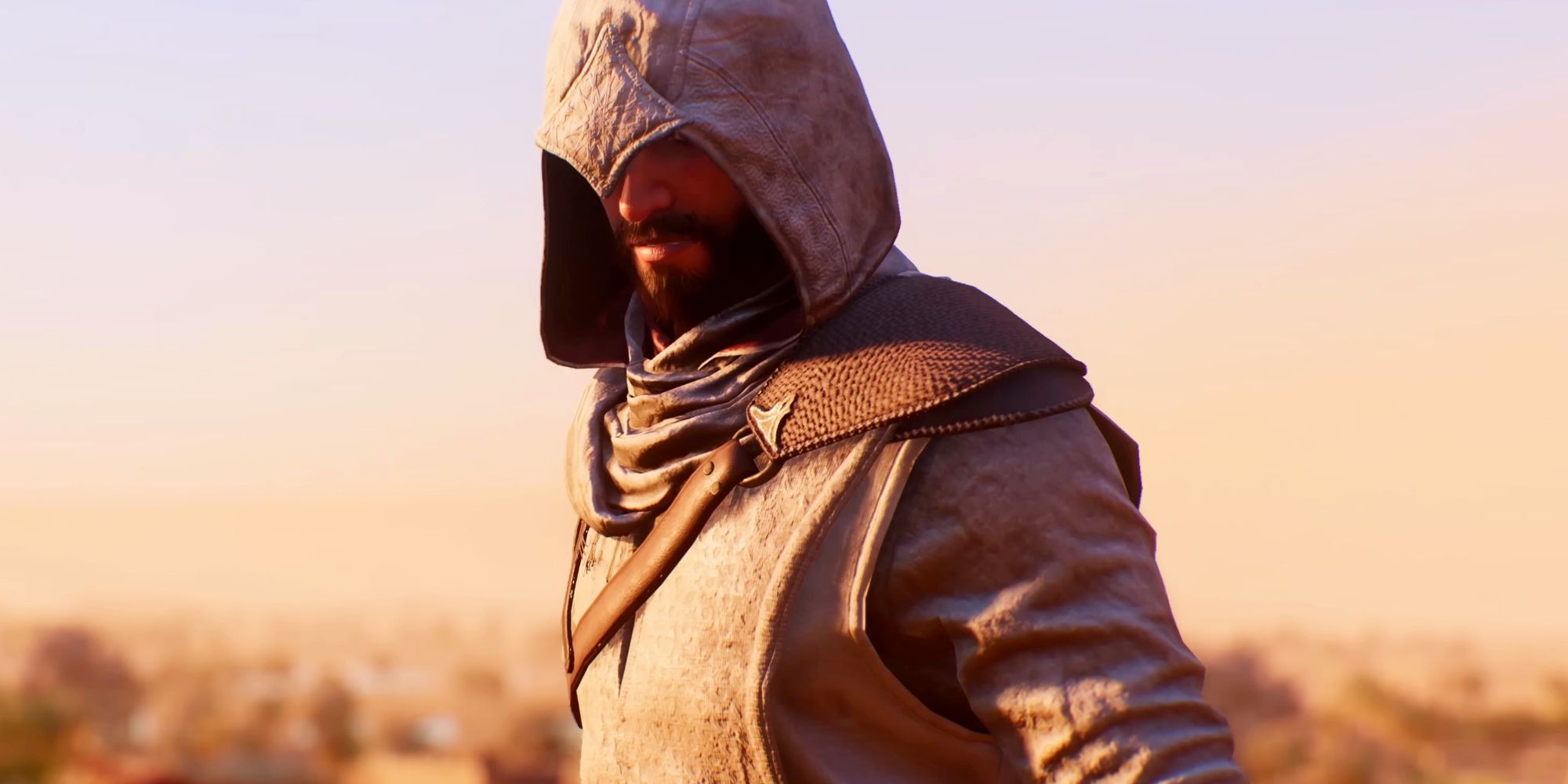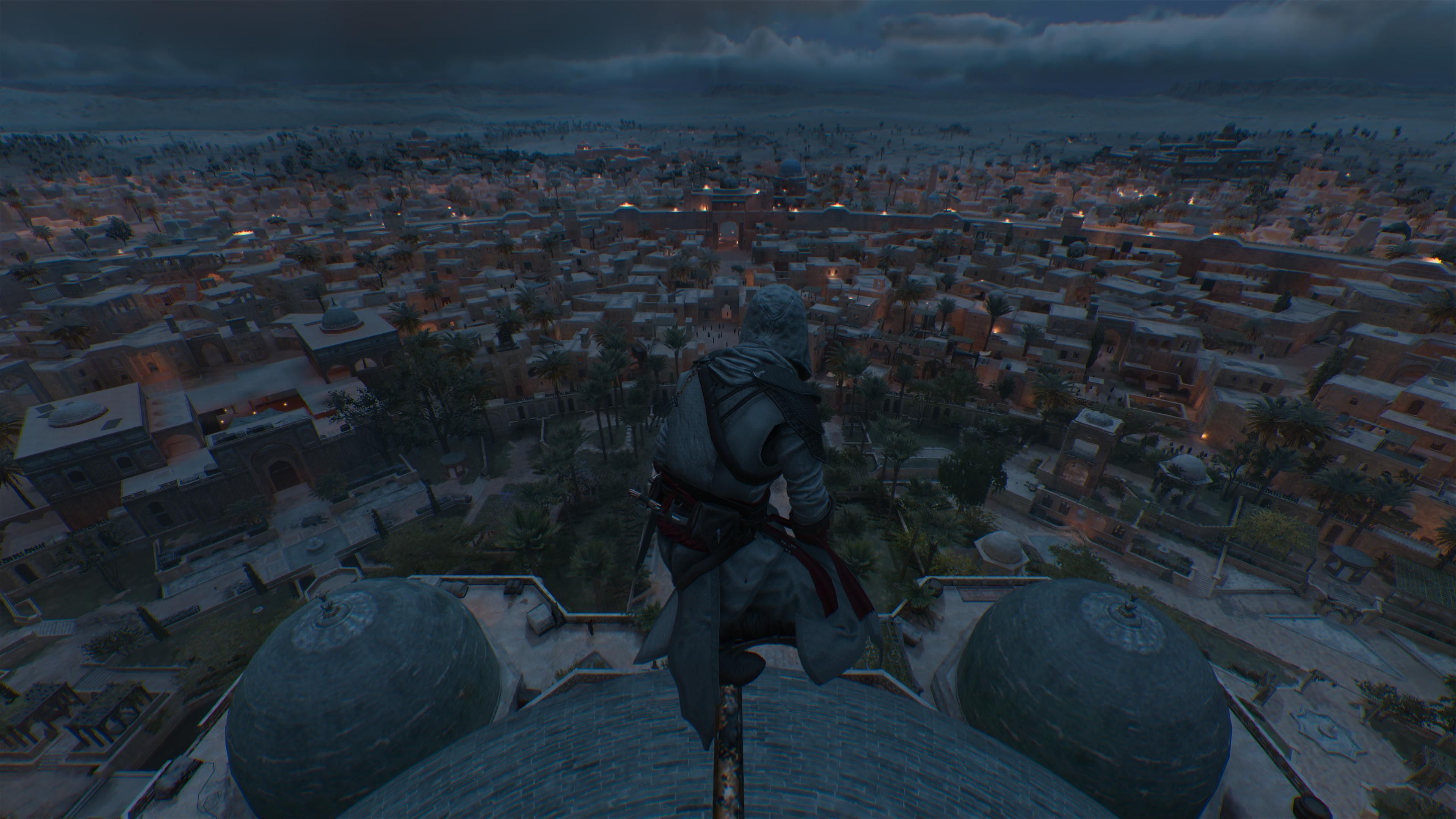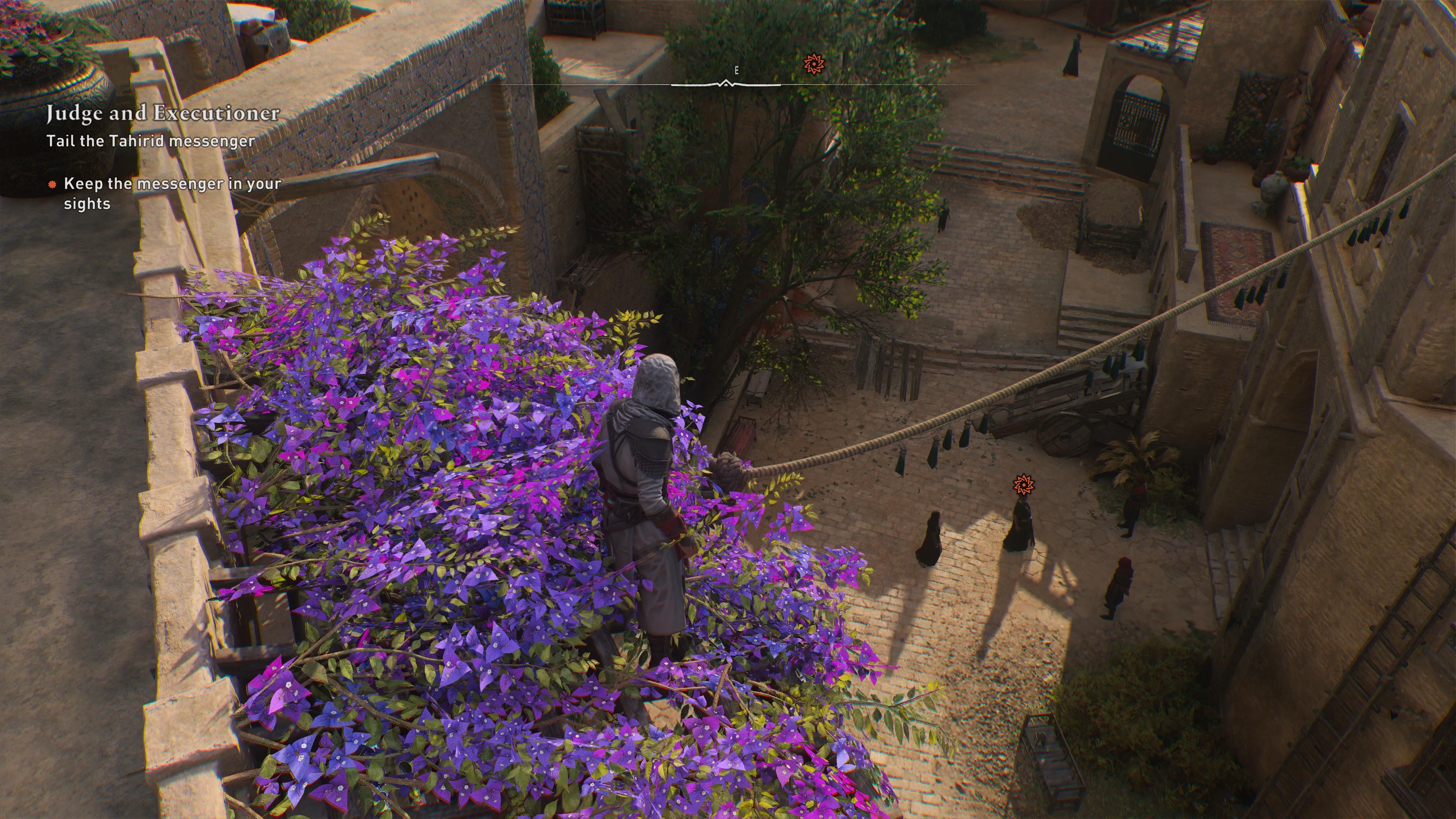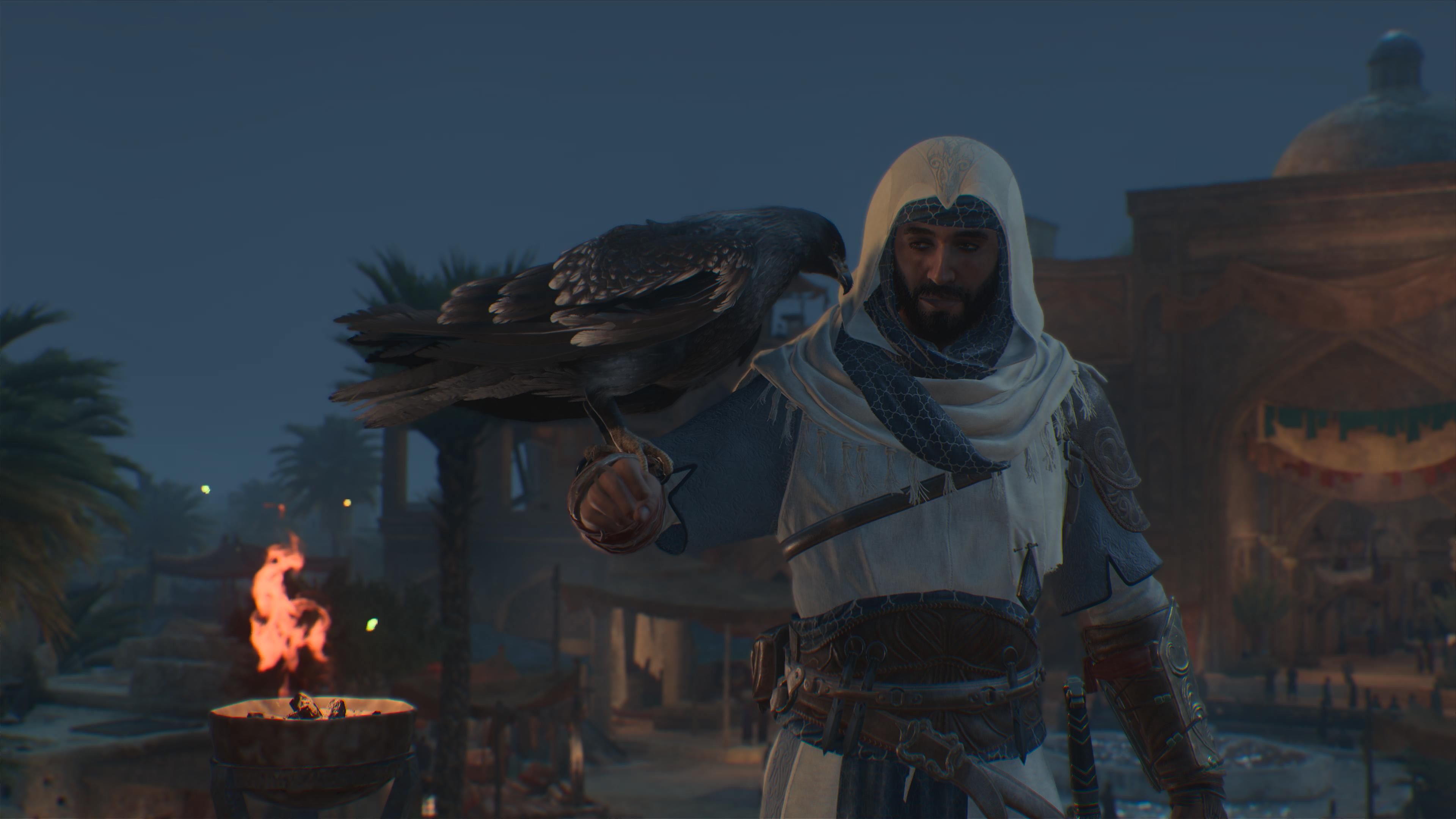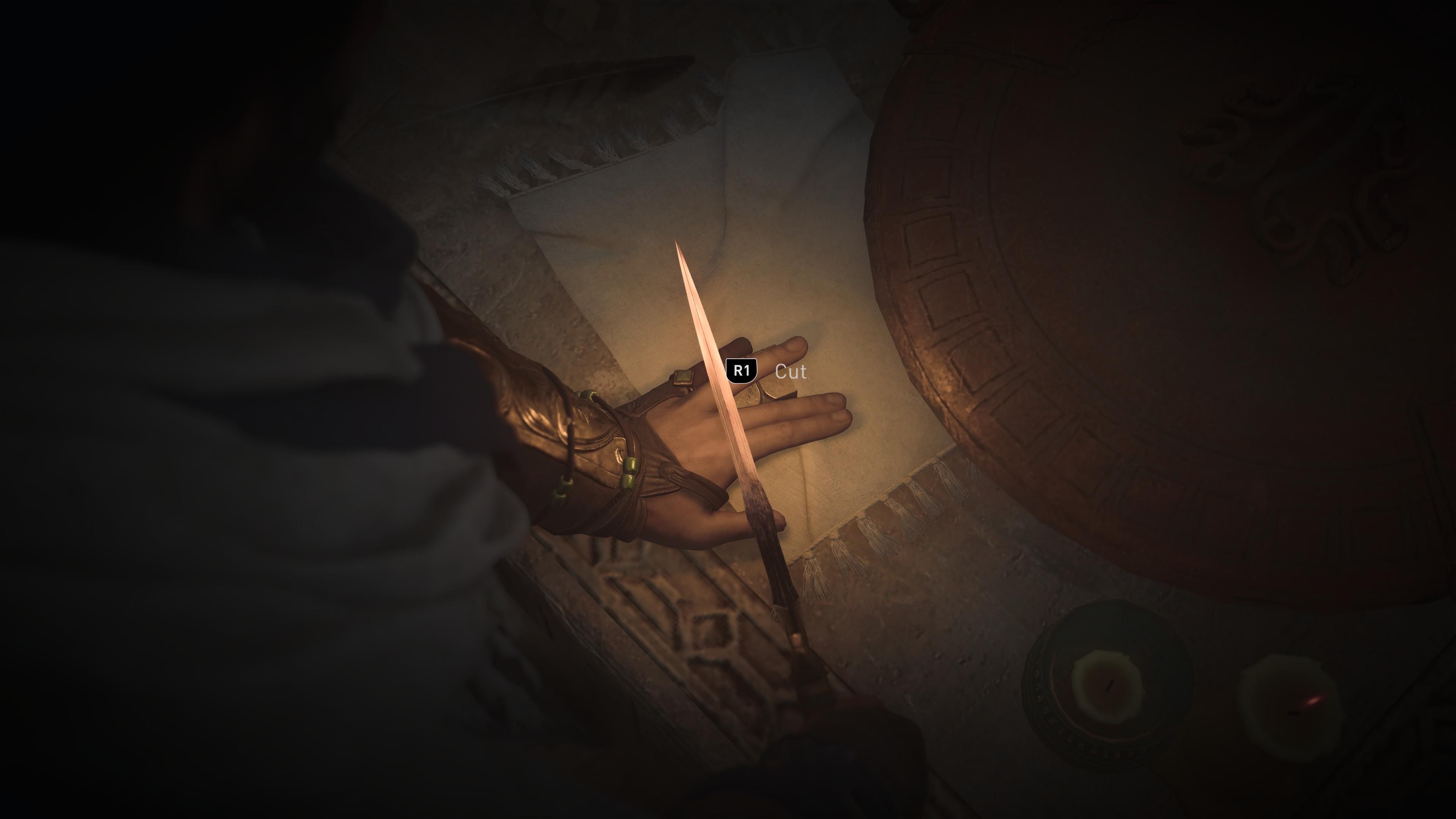Assassin’s Creed Mirage is a triumphant homage to its earliest predecessors, but it still suffers from issues endemic to the series. The stealth action game from Ubisoft Bordeaux is singularly engaging and refreshing in its constricted scope; still, tiresome trends from the series at large return, making key components of its story vapid distractions from its true strengths. While Mirage is clearly built upon the back of 2020's AC Valhalla, that foundation has been morphed into an experience heavily reminiscent of the original Assassin’s Creed from 2007. Mirage is a more than worthwhile entry to the long-running saga in its own right, but it also shows that the original vision of the series still has immense potential.
Mirage takes place in 9th century Baghdad, under the rule of the Abbasid Caliphate. An 11-year prequel to Valhalla, Mirage tells the backstory of its progenitor’s Basim Ibn Ishaq, a street thief who is taken in by the Hidden Ones, a precursor organization to the Assassin Brotherhood. Playing Valhalla is not necessary to enjoying Mirage, however; the latter’s narrative revolves entirely around Basim’s induction to the Hidden Ones, and his uncovering of the extent to which the Order of the Ancients (precursor to the Templar Order) is controlling Baghdad society. Mirage fires on all cylinders when it immerses itself in the city, its culture, and its history, but an inability to recapture Assassin’s Creed’s original mystique leaves its macro narrative at times confounding.
Embracing The Assassin’s Creed Legacy
My personal experience with Assassin’s Creed is likely not unique. The original was something of a revelation in both gameplay and story. Scaling walls, leaping off buildings, and escaping from guards in the 12th century Holy Land felt like a proof-of-concept for something greater, and the story – both Altaïr’s and Desmond’s – was tantalizingly mysterious. When Assassin’s Creed 2 came out, I was obsessed; I got every achievement, even the one for hunting down all those feathers. I still hold the Ezio trilogy in rather high esteem, but the veneer started to peel when Desmond’s story came to a baffling conclusion in Assassin’s Creed 3.
Black Flag was incredibly fun, and I even have a soft spot for Unity despite its disastrous launch. By the time Origins sought to reinvent the mainline series, I wholly welcomed the change, but that excitement was short-lived. Both Odyssey and Valhalla were far too large and repetitive for my tastes, and the Assassin versus Templar story I had once been enthralled by seemed so distant. The new Assassin’s Creed trilogy are perfectly serviceable, low-stakes RPGs, and are even impressive in their sheer scale, but I began to count myself among increasingly frustrated fans who longed for the series to return to its roots. Attempting just so with AC Mirage has been the messaging out of Ubisoft Bordeaux from the outset.
Seemingly first intended to be an expansion for Valhalla, Mirage forsakes the expansive English countryside that harbored its predecessor’s Viking invasion for the densely packed streets of Baghdad, a handful outlying villages, and the surrounding desert. Valhalla’s DNA is felt throughout – non-diegetic features like the menus, map, and HUD are even pulled wholesale – but Mirage centering almost entirely on a single city has condensed the familiar batch of open-world activities into something far more engaging moment-to-moment. That same inheritance, though, does not singularly strengthen Mirage’s narrative.
Pulling its main character from Valhalla does not work to AC Mirage’s benefit. Mirage admirably goes to great lengths to be a standalone experience, enjoyable even for those who didn’t play Valhalla. Basim himself is a decent protagonist, and the game feels well-rounded when it is focused on him and the task immediately at hand within Baghdad. It’s this inescapable connection to another Assassin’s Creed game that results in what could be Mirage’s biggest moments instead feeling impotently obtuse, despite nearly everything in between being a very enjoyable gameplay loop.
A Comprehensive Tour Of 9th Century Baghdad
Following his initiation into the Hidden Ones at their fortress of Alamut (under construction during Mirage in 861 CE), Basim becomes entrenched in sprawling investigations to weed out the five prominent Order members who have been abusing their amassed power in Baghdad. These investigations are delightfully similar to those conducted to discern Templar identities in the original game, but trade optional intel-gathering side activities for bespoke missions. Basim follows leads, collects clues, and eliminates lower ranking Order members throughout Baghdad and its surrounding environs. This return to narrative-driven gameplay shirks the RPG elements which seeped into more recent AC titles, bringing back the classic games’ emphasis on stealth, and even taking that emphasis further.
Open combat in AC Mirage isn’t necessarily difficult, but it is dangerous. In practically every mission, methodically finding your way to the objective while staying hidden and slyly eliminating guards is preferable. It never quite reaches the intricacy of Hitman’s puzzle-box levels, but the many main missions which task you with an assassination are compellingly layered. Almost every infiltration has multiple solutions, which may require a number of smaller tasks in pursuit of the final goal – finding a way past a heavily guarded wall, recruiting once-enslaved rebels to cause a distraction, hunting down an errant key, and much more.
Outside these missions, Mirage is similarly packed with objectives. Chests full of gear, clues to the locations of hidden loot, stories which highlight the otherwise disconnected plights of Baghdad locals, a number of collectibles, and more all serve to fill the space between main mission objectives. What emerges is a rather organic gameplay loop, where optional content can be explored on the way to the next story beat, resulting in an exceptionally thorough delve into the city’s streets. A comparatively tame gear progression system, in which outfits, swords, and daggers can be acquired and upgraded, and a modest skill tree are nice reprieves from the inconsequential baby steps provided by like systems in Valhalla.
Of the utmost importance to Assassin’s Creed Mirage is its notoriety gauge, which quantifies the crimes Basim has publicly committed in order to provide a measured response from Baghdad’s guards. With so many tasks urging you to comb the city, a never-ending game of cat and mouse underpins the entire experience. Getting caught pickpocketing, assassinating a guard in view of the public or the slain’s comrades, or trespassing in restricted areas heightens the danger, which can subsequently be relieved by tearing down wanted posters or bribing criers. Combined with combat better left avoided, the notoriety system promotes in Mirage one of the unadulterated joys of classic Assassin’s Creed – assassinating, from above and without warning, a long-sought-after target, and subsequently fleeing from the scrambling guards, breaking line of sight through deft parkour before finding a hiding place to slip once more back into the crowd.
The Legend Of Basim Ibn Ishaq
Baghdad and the stories and events therein make up the large majority of Assassin’s Creed Mirage, but the further the game strays on occasion from its primary setting, the more disjointed it becomes. Those who have played Valhalla know key information about Basim, but Mirage attempts to build up a mystery in pursuit of making itself a standalone experience. A clearly powerful and important object is introduced very early on, becoming intrinsic to Basim as a character, yet it’s practically forgotten for the entire game. Similarly, Basim is haunted by strange visions that receive no development in their regular appearances throughout – they are simply recurring until all is revealed in the story’s final moments.
These issues feel as if they stem from AC Mirage desperately trying to recapture the mystique of earlier entries, from when the Isu were still some unknowable entity. Because of this, Mirage’s primary plot is frustratingly uninteresting and unaddressed compared to its far more compelling and prominent secondary and tertiary stories (all of which are free of the series' much-derided modern day storyline). Basim’s relationship with his mentor, Roshan, the Hidden Ones’ secret war against the Order in Baghdad, and the revolving door of informants and assassination targets keep the story varied and moving at a nice pace, but as soon as Mirage takes a step back to bring in the wider Assassin’s Creed narrative, the wind is taken out of the sails.
Because of this attempt to simultaneously stand apart and fill in the backstory of Basim, a character important to Assassin’s Creed’s continuing narrative, Mirage ends up landing in some strange middle ground. It does an admirable job refocusing onto the series’ central conflict between the Hidden Ones and the Order of the Ancients, but the occasional nudge and wink alluding to the Isu end up feeling like shoe-horned obligations that ultimately lead to an unsatisfying conclusion. The silver lining is that this off-beat story does tend to fade into the background while spending an overwhelming majority of the game in Baghdad’s vibrant streets.
Assassin’s Creed’s Lost Potential
Despite some disappointing narrative moments, Mirage is a refreshing return to what Assassin’s Creed used to be, and consequentially a glimpse into what has been lost by the series being waylaid into vast, open-world adventures. In a sense, it feels like a victory lap – revisiting the main character cutting off a ring finger as part of their initiation, searching for the rooftop entrance to a Hidden Ones bureau, and pulling guards into a number of hiding spots to assassinate them incognito are all giddily familiar. On the other hand, despite inheriting some things directly from Valhalla, Mirage feels as though it picked up roughly where Syndicate left off in 2015 – an enjoyable and commendable restart, but not necessarily new and exciting.
Part of this may be attributable to Mirage releasing cross-generationally on PS4 and Xbox One in addition to PS5 and Xbox Series X/S. Clearly built with the same tools as Valhalla, Mirage is effectively a 2020 game with three extra years in the oven. This has resulted in a rather seamless experience – the frame rate was consistently high on PS5’s performance-targeting mode, no major bugs were encountered through a whole playthrough, and load times were fairly expeditious – but it leaves the feeling that Mirage could be something more, which personally leaves me hoping Ubisoft will produce more classically inclined AC games.
The return of social stealth, for instance, is more than welcome, but as an indirect successor, Mirage doesn’t follow through on advancements that were once being made for such game mechanics, like the claustrophobic crowds of Unity’s Paris. For now, it appears that the immediate future of Assassin’s Creed remains on the expansive action RPG side, with working title Codename Red set to take players to feudal Japan. Assassin’s Creed Mirage, however, is proof that scaling back down can result in a game that elicits some of the fondest memories of the series, even if such devotion to its heritage means some clunky components make it into the mix.
Source: Ubisoft/YouTube
Assassin's Creed Mirage releases on October 5, 2023 for Xbox One, Xbox Series X/S, PlayStation 4, PlayStation 5, PC, and Luna. Screen Rant was provided with a PS5 digital download code for the purpose of this review.

